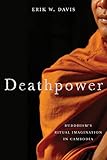Deathpower : Buddhism's Ritual Imagination in Cambodia / Erik Davis.
Material type: TextPublisher: New York, NY : Columbia University Press, [2015]Copyright date: ©2015Description: 1 online resource (320 p.) : 20 b&w photographsContent type:
TextPublisher: New York, NY : Columbia University Press, [2015]Copyright date: ©2015Description: 1 online resource (320 p.) : 20 b&w photographsContent type: - 9780231169189
- 9780231540667
- 294.3/43809596 23
- BQ5020 .D38 2016
- online - DeGruyter
- Issued also in print.
| Item type | Current library | Call number | URL | Status | Notes | Barcode | |
|---|---|---|---|---|---|---|---|
 eBook
eBook
|
Biblioteca "Angelicum" Pont. Univ. S.Tommaso d'Aquino Nuvola online | online - DeGruyter (Browse shelf(Opens below)) | Online access | Not for loan (Accesso limitato) | Accesso per gli utenti autorizzati / Access for authorized users | (dgr)9780231540667 |
Browsing Biblioteca "Angelicum" Pont. Univ. S.Tommaso d'Aquino shelves, Shelving location: Nuvola online Close shelf browser (Hides shelf browser)

|

|

|

|

|

|

|
||
| online - DeGruyter Creating a Learning Society : A New Approach to Growth, Development, and Social Progress, Reader's Edition / | online - DeGruyter Impersonal Enunciation, or the Place of Film / | online - DeGruyter The Silent Qur'an and the Speaking Qur'an : Scriptural Sources of Islam Between History and Fervor / | online - DeGruyter Deathpower : Buddhism's Ritual Imagination in Cambodia / | online - DeGruyter Journalism After Snowden : The Future of the Free Press in the Surveillance State / | online - DeGruyter Centrifugal Empire : Central-Local Relations in China / | online - DeGruyter A Philosophy of the Insect / |
Frontmatter -- Contents -- Acknowledgments -- Note on Transliteration -- Introduction -- 1. Getting Sited in Cambodia -- 2. The Funeral -- 3. Rice, Water, Hierarchy -- 4. Building Deathpower and Rituals of Sovereignty -- 5. Binding Mighty Death -- 6. Gifts and Hungry Ghosts -- 7. Eating Leftovers, Rumor, and Witchcraft -- 8. Buddhism Makes Brahmanism -- Notes -- Khmer Glossary -- Works Cited -- Index
restricted access online access with authorization star
http://purl.org/coar/access_right/c_16ec
Drawing on extensive ethnographic fieldwork in Cambodia, Erik W. Davis radically reorients approaches toward the nature of Southeast Asian Buddhism's interactions with local religious practice and, by extension, reorients our understanding of Buddhism itself. Through a vivid study of contemporary Cambodian Buddhist funeral rites, he reveals the powerfully integrative role monks play as they care for the dead and negotiate the interplay of non-Buddhist spirits and formal Buddhist customs.Buddhist monks perform funeral rituals rooted in the embodied practices of Khmer rice farmers and the social hierarchies of Khmer culture. The monks' realization of death underwrites key components of the Cambodian social imagination: the distinction between wild death and celibate life, the forest and the field, and moral and immoral forms of power. By connecting the performative aspects of Buddhist death rituals to Cambodian history and everyday life, Davis undermines the theory that Buddhism and rural belief systems necessarily oppose each other. Instead, he shows Cambodian Buddhism to be a robust tradition with ethical and popular components extending throughout Khmer society.
Issued also in print.
Mode of access: Internet via World Wide Web.
In English.
Description based on online resource; title from PDF title page (publisher's Web site, viewed 02. Mrz 2022)


